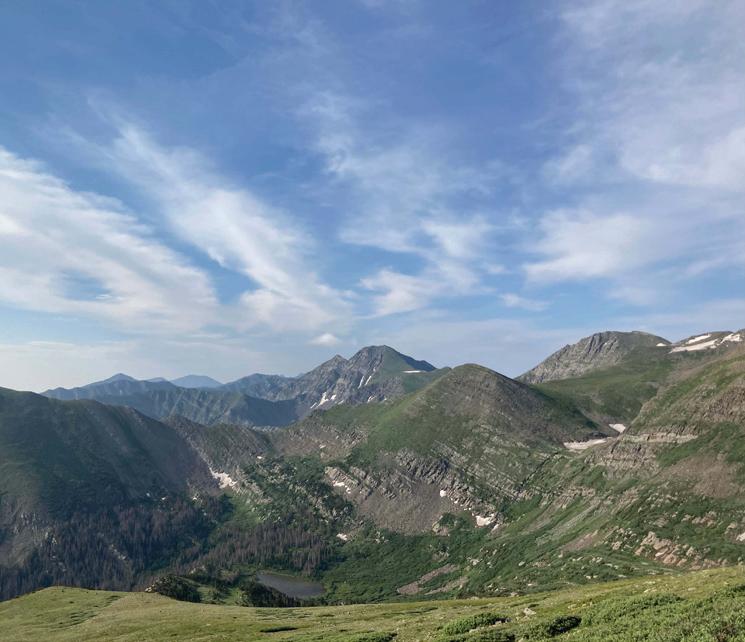
16 minute read
Staying Found in the Wilderness
It is fitting that I get to take this season of Lent, as well as the “Lost and Found” theme, to share with you about our high school summer trip. We’ll be going on a faith adventure experience through Rainbow Trail Lutheran Camp in Colorado. As the 40 day season of Lent calls to mind the Israelites’ wandering in the wilderness, and then Jesus’ measured movement to the cross, it could be said that the essence of Lent is meaningful journeys such as these. And this year, Jesus invites our young people to follow in His footsteps, and those of the disciples, up a high mountain…
We will only be on trail in the Colorado wilderness for four days, but I am certain our time spent together will have profound impacts on all of us. When it comes to backcountry camping you take only the essentials. The paradoxical saying of “less is more” becomes very real for all involved. When essentially all you have is the environment around you and the company of your group, you experience reality in a whole new way. You go into deep conversations with friends that are otherwise hindered by the ever present demands of daily life. And you have the time and space to go deep into your own thoughts and talks with God in quiet moments by a lake or wildflow- er meadow. I have been participating in and leading wilderness experiences for years and over and over again the theme I hear from youth participants is their relief that they are freed of distractions as they desire authentic moments like this to discern what’s happening in their lives.
Advertisement

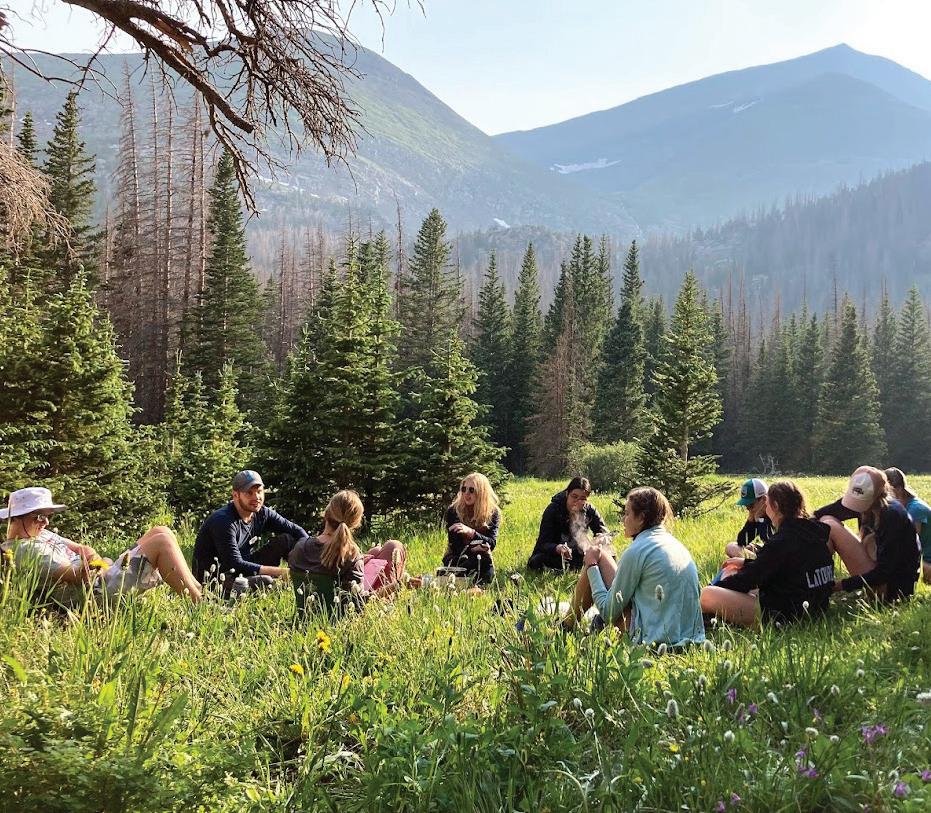
What I have seen happen for others, and will attest to myself, after trips like these might be best described as transformation. The immersive experience of a backpacking trip becomes a catalyst for spiritual growth like nothing else can. I think of when Jesus took Peter, James, and John up a mountain and was transfigured before them. Each of our youth will encounter Christ, experience Christian community, and engage with scripture in a radically new way. On top of that, the actual physical, mental, and emotional challenges and triumphs that come with outdoor adventures provide innumerable learning opportunities and self-confidence boosters. One is truly a new person when they step off trail at the end of the week (a feeling that is only amplified by their first shower after four days spent outside).
So what does this have to do with Lost and Found? We continue the practice of Jesus, retreating to the outdoors and wild places to rest, reflect, pray, and worship. This is an often overlooked and under-utilized spiritual practice; especially in a culture of ever increasing busyness, distraction, and attachment to electronic devices and cultural demands. We are at risk of losing touch with a powerful means of connecting with God. So, it is vital that we invite our young people to encounter God in the natural wonders as God’s people have done since creation. In doing so, they come down the mountain having found a renewed spiritual life and a new sense of self. One that I have seen propel them into a new phase of life full of direction and sense of call to serve their neighbor and the world.
In the world of backcountry navigation the saying goes, “stay found.” This means that one should regularly check their progress by way of map, compass, and landmarks (yes we’ll have GPS too, yay technology!). It is my hope, not only for this trip, but year ‘round and for all who experience high school ministry with us at St. Andrew, that we “stay found” in our identity in Christ.
See you on the trail!
Brent Haglund High School Ministry Director

Getting lost is easy. For example, when driving. Even with voice commands from the GPS in my car, I still sometimes manage to take a wrong turn, which will prompt the GPS to say ‘If possible, make a U-turn’, sounding vaguely exasperated. Or at work: When I plan to prepare for an important meeting or deadline, and halfway through the workday, I realize that I have done a million other things but have not focused on what matters. Or in my personal life: when I am pulled in too many different directions, and don’t notice that a family member or friend is feeling neglected. And all those examples are quite harmless compared to the really scary ways we can get lost in this life: toxic relationships, substance abuse, health issues, depression. ‘If possible, make a U-turn’. Sometimes that’s easier said than done.

Getting lost is stressful. Confusing, unsettling, or even downright scary. And all that extra adrenaline usually makes things worse: there’s a pretty good chance I will mess up the next couple of GPS directions after that first wrong turn, because now I’m disoriented; there’s a pretty good chance I’ll be thinking ‘I will never make that deadline, it’s too late now’; and there’s a pretty good chance that I’ll get defensive when my mom asks me why I have not called her in days. ‘If possible, make a U-turn’.
I can’t say that the parable of the Prodigal Son is one of my favorites. I tend to side with the son who’s done all the work all along and feels that throwing a party is a bit much for that scoundrel coming home. But the central point of the story for me is this: The lost son realizes that he is lost. And that he needs help. He comes home because he wants to be found, not to be rewarded. He makes that U-turn. To me, that is the key. When I feel lost, I pray. Because I want to be found. I want to re-focus and be peaceful again, and I need God’s help to achieve that. A prayer can take many different forms. Taking a deep breath. A work-out or a power walk with the dog. Gardening. Spending time with family and friends. Listening. Making a meal. Enjoying fellowship. Attending worship. Taking time to serve others. Slowing down enough to let the adrenaline go, and God back in. That is the other key to the story of the ‘Prodigal Son’ for me: God is always ready for us to be found, if we can admit that we’re lost. If we can make that U-turn.

Meggy Wagner Senior Director of Church Operations

When I hear the words “Lost & Found”, it makes me think of those lost & found boxes that have forever been a staple in many classrooms and schools. During the long winter months in Minnesota, most likely a day never goes by that a winter clothing item such as a mitten, hat or sock doesn’t go missing. As you can imagine, there are always several pair of the same mittens, snowpants, etc. in the same classroom. Despite every teacher’s well thought out plans of organization for getting each child ready for winter play each day, it is an amazing and exhausting under taking each day to help each child get dressed, undressed, and home with all of his/her correct winter gear. At. St. Andrew Early Learning, we embrace the importance and benefits of outdoor play and fresh air, and we know how this is teaching children independence and self help skills. It is wonderful to see everyone spring into action to help a classmate locate a missing item. It makes everyone happy when they can help each other and also puts a big smile on the face of the child when they find their missing item. Earlier in the year, we had a classroom where two children wore the same pair of boots to school. One of the children got home with no boots and the other child got home with two pair of boots. The parent whose child got home with two pairs of boots wanted to make sure the other child didn’t have to go a long weekend with no boots, and so they made a trip back to St. Andrew to bring back the boots. This was greatly appreciated by the family. We are so blessed with the kindness of our Early Learning families! Just like in the parable of the lost sheep, the shepherd was so happy to have found his sheep, we too are happy when we find something we have lost. Jesus reminds us that everyone is important to him. He loves us so much that he will never give up on us. He never wants us to be lost.
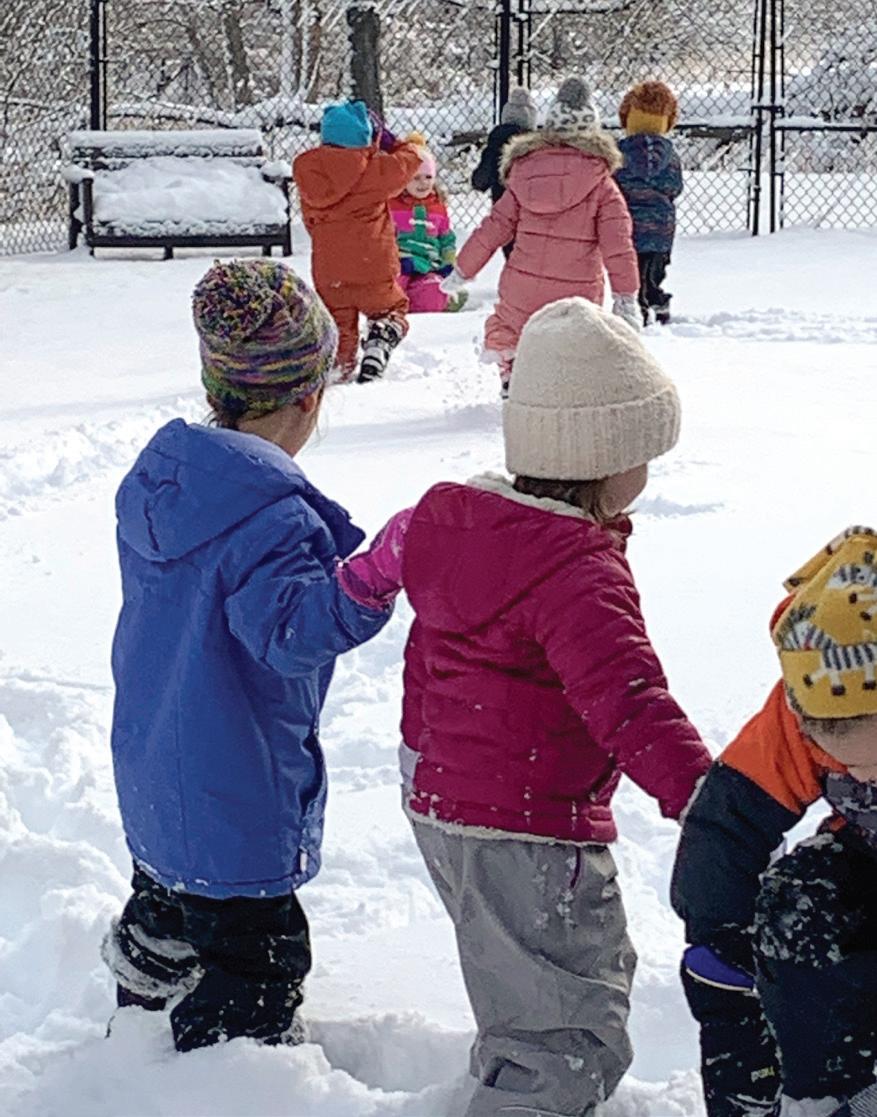
When my kids were little, it seems like I would have to make a trek once or twice a year to their Elementary School to look through the “Lost and Found” for some item that had been misplaced, that they would tell me they couldn’t find. Often times this was gloves, a hat or snowpants—some item that they needed to play outside at recess. I was often amazed at some of the items I would find in the “Lost and Found” box. Look—here is one shoe? Wouldn’t you think that if you were missing one shoe you would notice? Here is a pair of glasses? Glasses are expensive! Wouldn’t you think if you were missing a pair of glasses, you would claim them! A nice winter coat—wow, someone must be pretty cold! Sometimes I would find the item (or items) I was looking for, and sometimes I wouldn’t, but it was always an interesting adventure, and I would often wonder why someone wasn’t looking harder for some of the items that I would find in that box, especially important items that seem like they would be precious to the person that lost them.
This is why, it doesn’t really surprise me to know the lengths that God goes to find the lost in the stories that we read in the Bible. Many of us may have experienced a time where we felt lost, maybe even far away from our faith or God. I’ve had a few times like that in my life, and each time God has gone to great lengths to seek me out, even when I tried to ignore God. This happened most recently for me in 2016, after being a severe car accident. This car accident left me with severe injuries, and after a long hospital stay, I was put into a long term care facility for rehab. I was in the hospital for a month, and then the rehab for five months. I was struggling with my faith, and I was someone who at that point had given almost 20 years of my life to working in the church. There were a lot of people praying for me, and visiting me. As a matter of fact, I think at one point, one of the nurses made a joke about how she had never met so many different Pastors before in her life! I was on a lot of prayer lists. I resisted talks of my faith with most of them. A college friend had a family friend that began praying for me. On her own, Nancy decided to start sending me notes of encouragement with prayers and scripture. For the entire time I was in the rehab, and after I returned home, I received at least one, sometime more than one note each week from Nancy, who I had never met. I began looking forward to reading her notes and prayers, and eventually, even found that God used Nancy in an amazing way to bring about not only physical, but spiritual healing during a time where I felt incredibly lost. Years later, I was able to meet Nancy in person, and thank her for the profound impact she had on me, during an incredibly difficult time.
We are God’s children, and it is incredibly Good News, that we follow a God, that doesn’t give up searching for us when we are lost and that we never have to worry about being forgotten like a discarded item in “Lost and Found” box. Perhaps this Lenten season we can find ways to reach out to others who may be feeling lost in big and small ways. Perhaps you can think of ways you can reach out, like Nancy did, and be Christ’s hand and feet in the world and in so doing, you can live out your faith in your daily life in a very real and powerful way.
Shawna Berg Children’s Ministry Director
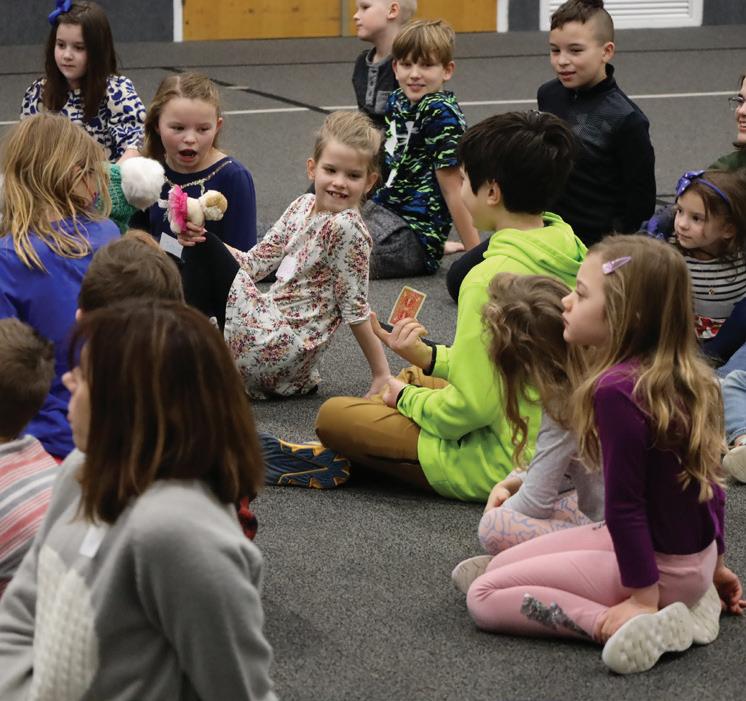



One of my pastoral roles (and joys) is to host St. Andrew’s quarterly New Member Information Sessions. Participants already have engaged in St. Andrew in a variety of ways. At the start of the session, I ask the question “What do you like at St. Andrew the most”? The responses are a strong affirmation of our ministry. Responses like “the sermons are relevant to my life”, “worship is always so great and with good music”, and “I like the children’s programming” are common.
During my presentation, I also take the chance to answer what I like most about St. Andrew, too. I think I have a good perspective and there are lots of things to appreciate. Growing up shadowing my father (a pastor) and mother (a church musician), helped me understand smaller churches in different regions of the country and world. I have been a lead pastor, associate pastor, and an executive director. Suffice it to say that I have a few opinions on what makes a strong congregation like ours. What do I like about St. Andrew?
First, I like being part of a bigger church. We do things I never thought of doing in my smaller churches I have served. There is potential in numbers, both in our demographics and in our financial giving. We can make a measurable impact. A case in point is the hosting of the Feed My Starving Children MobilePack last October. This event required hundreds of volunteers (437 in fact) and a financial commitment of nearly $30,000. The smaller churches I have been a part of would have difficulty doing such a project. But, for St. Andrew it was a great success. Honestly, if there is a constructive idea for a good ministry at St. Andrew, it may be in the range of possibility. Big churches can celebrate these kinds of ministries.
Second, I think there is something to be said for the ability to be highly engaged personally as well as anonymous at times. Many people like the fact that they can keep church life simple. They come to St. Andrew to worship God and blend in. As a corporate church, St. Andrew has a strong and competent staff who will make sure all aspects of the ministry hum along. Members can sit back and take it in. With busy and full lives, this is all that members often need. But, just as important, we will constantly invite you into deeper relationships with God, each other, and into service of our neighbors. We want to put our faith in action more and more often. I think St. Andrew has the best of both worlds—members can blend in when they need to rest in God’s goodness. And, they can step into well-organized opportunities to learn and serve.
Finally, St. Andrew is innovative and forward-looking. We take our heritage seriously. We are a Lutheran congregation and we hold tightly to our Lutheran faith— the overarching grace of Jesus Christ for our lives. We stick to the Lord’s Prayer, Baptism for infants, Holy Communion, and that we are all sinners in need of forgiveness and peace. But when it comes to striving for excellence in today’s world, we always ask what will make us more effective in our sharing the story of Jesus with our community. For instance, did you notice that we are tinkering with our 10:30 AM service starting this past fall? Check it out if you have not already. We think this kind of contemporary service will be attractive to new people. Also, we know our society is seeking an authentic and open desire for greater diversity and inclusion of all of God’s people, from the Black to the LGBTQ+ community. St. Andrew’s A More Just World provides for us an impetus for listening, conversation, and growth. We believe that we can hold onto our heritage while also be creative with the ministry.

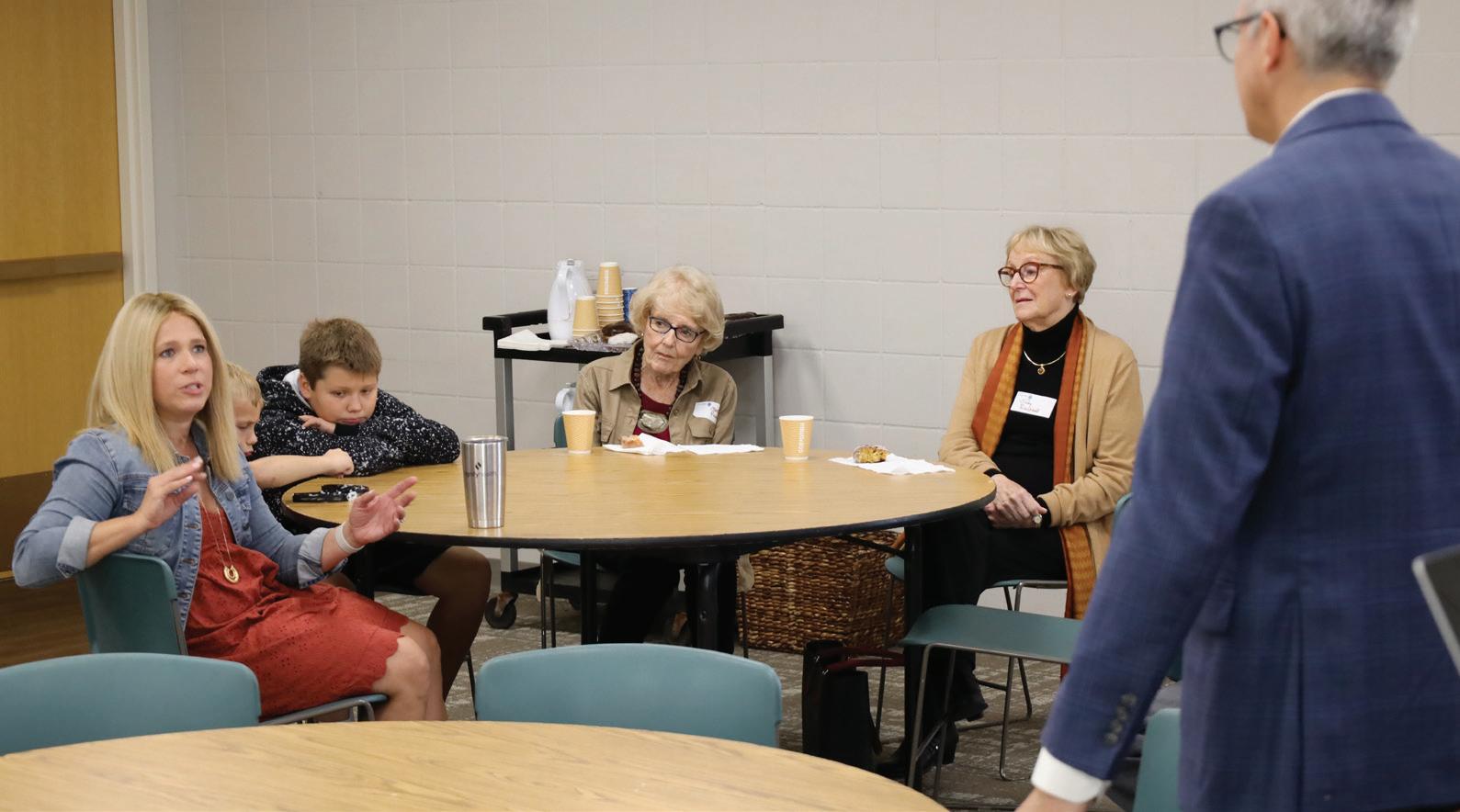
So, these are some of my answers to the question “What do I like most about St. Andrew?” How would you answer this? The way you answer this question is what others need to hear. This will help our church grow. I think you’d be surprised that studies show that people come to church not because of solid worship, preaching, and music (though this is vitally important and something we strive for). People don’t come to a new church because of warm and friendly people or the easy parking (though these things are important). Studies show that new people try out a church because someone in their friend group spoke well of it and invited them. That’s it. Join me in sharing with others how St. Andrew makes a difference in your life and our world.
Peter Johnson Pastor of Service & Small Groups
We go through so many different transitions throughout the course of our lives. Which means that we go through different periods feeling lost and then feeling found. During the periods of feeling lost, I think it is so important to have those safe, caring, trusted people in your life to help be with you and guide you back. To help you realize you are being seen, hear, loved, and that you are exactly where you are supposed to be each step of the way.
This year in our confirmation program, we changed up what are 8th graders are doing as they transition out of confirmation to getting confirmed, and then into high school. We added in a mentor program. Building deep, good, quality relationships with a caring adult is so important to our lives, especially our lives of faith. And the transition from middle school into high school can be a very difficult one in their personal and spiritual lives.
Our 8th graders will be confirmed at the beginning of May, where we welcome them as an “adult” in our church community. We kind of make it seem like they should have this faith thing all figured out and we send them out to live that life of faith. That just seems crazy! I still don’t have everything in my faith life figured out which is why we need those mentors who have different experiences of being lost and found who can help share their stories with us and be there to guide us back to being found when we end up lost.
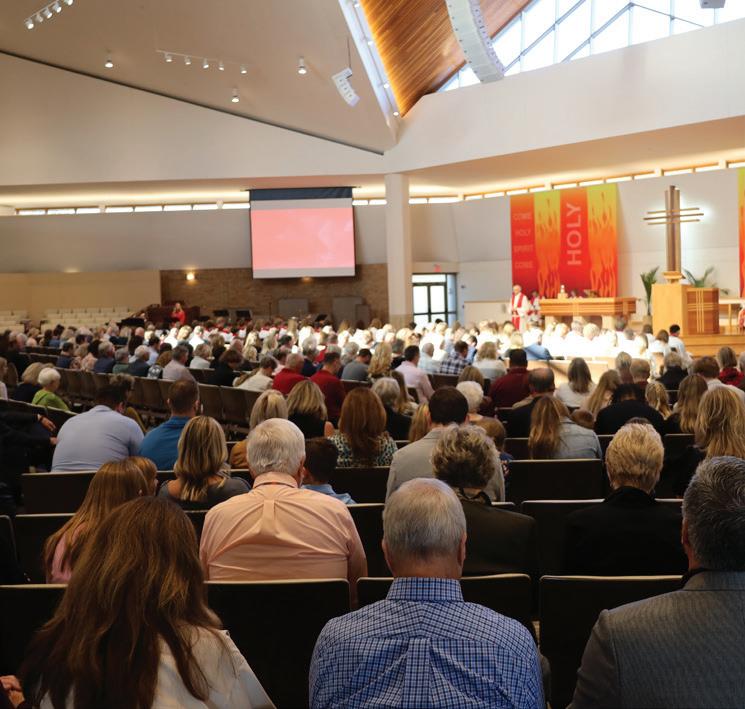



The most amazing things about having mentors and small groups leaders in our confirmation ministry is to show that these youth are cared for, and it is making a difference having these adults in their lives. We have 8th grade small groups who still want to meet with their leaders after their class portion of the program has ended. That is because those relationships and trust they built has changed each other’s lives. It makes a difference in their faith lives having someone show them God’s love through listening and being present. It is through these faithful people that God is pulling each youth into the Body of Christ telling them that they are found and will never be lost.
We all need those people in our lives. Don’t forget to thank them and reach out to others to be that person for someone else. Go and be found.
Sarah Fike Pastor of Children, Youth, & Family

Iventure to say that all of my elementary school teachers had a box in the classroom marked ‘Lost & Found.’ It was always an adventure digging into the box of lost scarves, mittens, caps, etc. Most of the time I found nothing of value in the box and it wasn’t worth the time or effort to search.
I can understand not bothering to look for some things we’ve lost unless we consider it of great value. Many lost objects can easily be replaced. But what about people? Do people get lost and can people become lost from God? In Luke 15 Jesus tells three stories about being lost: a lost sheep, a lost coin, and a lost son. In the stories, Jesus explains that the things lost need someone to look for them or else they’ll never be found and that God is always looking to be close to us.
In early June 1982 I planned a canoe trip for our 12-year-old son and me in the Boundary Waters Canoe Area near Ely. We were canoeing and portaging for 8 days. The trip was going along great until day 7. We followed the map and compass to find our next portage but we couldn’t find it. The map showed the spot but we couldn’t find it amid all the huge boulders on the shoreline. We paddled back and forth several times but no portage. Adding to our predicament was the fact that there was a steady, cold spring rain. We pulled onto shore and built a fire, warmed up and ate a snack. While we sat there feeling sorry for ourselves a couple men popped out from between the huge boulders carrying their canoe, dropped it in the water, waved to us and left. Little did they know how much they helped us to find our way to the next lake.
Sometimes in life, we find ourselves in situations where we’ve lost our way and simply can’t find the way out. The lost sheep and lost coin were going to stay lost as long as no one bothered to look for them but we expect that when people are lost or spiritually confused and can’t seem to find God, he’ll make the effort to find us. In the story of the lost son, Jesus says that a day didn’t pass when the father didn’t look down the road hoping he’d see his son return to him. Sometimes God uses other people or even difficult circumstances to help us find our way back to him just as the canoeists helped my son and me find the portage. We had everything we needed except how to move forward to the next lake.
Imagine feeling lost from God or our family or lost from our friends and hoping someone will miss us, know that we’re lost and look for us. How terrible it would be to feel that no one cared enough for us to come looking for us. The father in the parable of the lost son made a way possible for his wayward son to return to him because the son always felt loved and accepted by his father. Remember how the son says, “Surely my father will receive me back, if not as his son but perhaps as a servant.” In these stories of ‘lost & found’ we all have a role—we might feel lost and separated from God or others or we may be the one who helps someone lost find their way back into that relationship. This coming Lenten season is 40 days long—that’s plenty of time for us to come closer to God or to help someone else find their way back to God. The journey is just ahead, let’s be a person who either follows the way or points the way to God.
Roger Schindel Visitation Pastor





